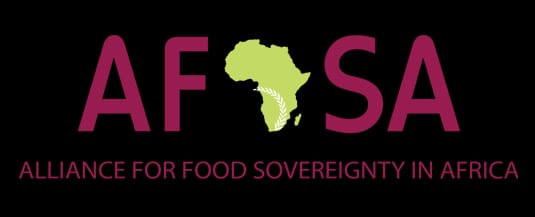Chuks Oyema-Aziken
The Alliance for Food Sovereignty in Africa (AFSA) has welcomed commitment by Africa leaders to free the continent from hunger.
AFSA in a reaction to just concluded three days of ‘food and agriculture delivery compact’ negotiations in Dakar, said the shared resolve for Africa to feed itself is a thing of dignity and pride.
AFSA in the press release by Communications Officer, Kirubel Teshome commended the increased investment and the renewed commitment of governments to allocate 10% of public expenditure to agriculture.
“We applaud the resolve to escape from the shame of dependency on food imports and handouts. We share the recognition of the need and benefits of engaging youth in agriculture and the appreciation of the fundamental role of women in food production.
“We acknowledge the vibrant catalytic role of the African Development Bank in mobilising such widespread African government support and enthusiasm
The group expressed concern that any significant increase of African land under agriculture will undermine human rights.
“Wherever large-scale land acquisitions occur, we see failure to gain community consent, failure to compensate, forced evictions of indigenous people, women’s loss of access to productive land, deforestation, loss of biodiversity, and land degradation.
The intense focus on two cereals – wheat & maize – is a rejection of Africa’s vast catalogue of nutritious indigenous crops and local varieties. Resilience comes from diversity – in crops, food sources, soil amendments, and supply chains.
“The failure of government leaders to see beyond the colonial narrative that African agriculture can only be modernised by adopting the practices of the Global North. Africa has its own resources and know-how to produce healthy food using effective, low-cost, chemical-free inputs, regenerating the soil sustainably.
Therefore:
“We reject the continued reliance on colonial thinking – to raise production of staple crops using imported farm inputs, chemical fertilisers, pesticides, and hybrid and GMO seeds. Food sovereignty is freedom from external control. A country dependent on imported fertilizer has lost its sovereignty as much as a country that depends on food imports or donations.
“We reject the tendency to entrust African agriculture and food to multinationals while ignoring the continent’s positive attributes (number of farmers, youth and arable lands). Africa should not copy the mistakes of others, but rather bring a new way of doing things.
We denounce the reliance on a top-down, public-private partnership approach to agricultural development. Where were the voices of African farmers and citizens at this food summit?
“This summit propagates the idea that African farmers don’t produce enough food because they don’t use enough chemical fertilisers,” said AFSA General Coordinator Million Belay. “The implication is that if we pump our farms with agrochemicals, we will grow more food. Even though this might serve as a short term strategy, in the end it means polluting the soil, making farmers dependent on external inputs, endangering the health of farmers and consumers, robbing people of their right to healthy, culturally appropriate and nutritious food, and increasing vulnerability to climate change.”
“Africa faces the triple burden of malnutrition – hunger, micronutrient deficiency, and obesity/non-communicable diseases. Zambia showed us the failure of hybrid monocrops, which produced back-to-back maize surpluses yet became the most undernourished country in Africa, with 40% of young children stunted. In South Africa, the continent’s most industrialised country, GMO maize is the staple food, and fast food is the urban norm. Now, half of all adults are overweight (23%) or obese (27%), and NCDs like diabetes cause life-altering illnesses, disabilities, and premature death.
“The authentic African solution is a commitment to agroecology and food sovereignty – the right to healthy and culturally appropriate food produced through ecologically sound and sustainable methods and the right to define one’s own food and agriculture systems.
“AFSA calls on African governments and donors to redirect funding away from failed ‘green revolution’ approaches towards proven agroecological alternatives. Uniting generations of indigenous knowledge, farmer-driven and science-based innovations, and the ecosystem’s natural processes, agroecological food systems can adapt to and help solve the climate crisis. Farmers, pastoralists, fisherfolk, indigenous peoples and local communities use agroecology to steward their land sustainably, produce nourishing food that celebrates cultural heritage, and strengthen local markets and economies. This way, together, we can feed Africa,” the press release added.



